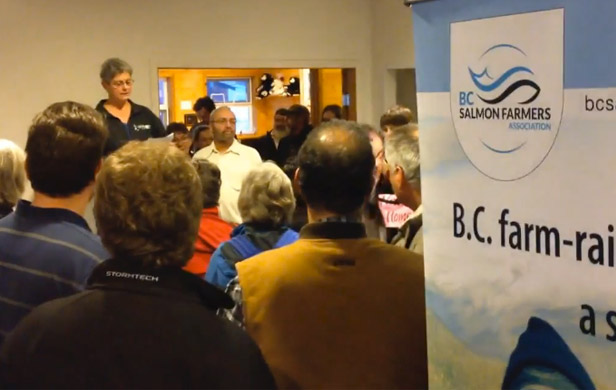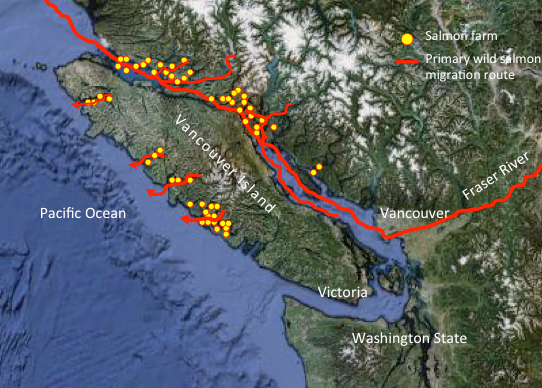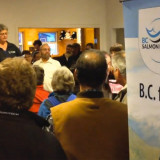
On February 10, 2015, Grieg Seafood held an open house in Port McNeill on two new salmon farm applications it is proposing – a requirement of the application process to the Province of BC.
It was a small room in a Port McNeill hotel. Huge pictures of salmon farms formed a center column blocking a clear view across the room. It was designed so people would shuffle around the edges of the room in small groups to be met by industry reps with name tags that provided only first names. One representative from DFO and one from the Province of BC were present.
The event had been scheduled during a “dangerous cargo” ferry run, making it inconvenient for working people from the nearby island community of Sointula to attend. So they pooled resources and paid fuel for the 48-passenger vessel Naiad to pick them up. One hundred and twenty people showed up to this open house, about 15% of the entire community of Sointula, as well as people from Alert Bay, Port Hardy and Port McNeill. Local people concerned about impact on their livelihoods.
Bait and switch
If approved, these two salmon farm applications in Clio Channel in the Broughton Archipelago will threaten the BC coast with several dangerous precedents. First, the sites are less than the 3 km apart, the minimum distance set by the Province of BC. Second, these locations are currently approved for shellfish aquaculture. If shellfish sites can be easily upgraded into fin fish aquaculture and farms placed closer together – the floodgates open.
This is how the salmon farming industry runs into the same brick wall over and over again. Increasing the number of farmed salmon in a region breeds catastrophic viral and sea louse epidemics that eat into corporate profits, driving the industry to expand again and causing the same problems all over. No learning curve here! The stakes are high.
Public gets fired up
As the room became unbearably hot, people became angry at the lack of any opportunity to raise their concerns. Then local resident and filmmaker Twyla Roscovich picked up a cowbell, got people’s attention, and asked how many people did not want more salmon farms. While a Grieg employee tried to dissuade Ms. Roscovich, the room broke out into an uproar as a sea of hands shot up and a loud chorus cried out, “No more fish farms!”
Shrimp fishermen who where going to lose their most productive shrimping grounds, local fishing lodges, whale watching companies, local First Nations and also a First Nations woman, Tamara Campbell from Boston Bar up the Fraser River – all who need wild salmon – stepped up together, many standing on chairs to be heard above the chatter. They wanted to know why they should accept this threat to their livelihoods and wild salmon for nothing in return. Campbell made the point that while coastal nations might decide to partner with the industry, Fraser Nations are ignored. Their salmon are running through the effluent of the over 100 salmon farms on the BC coast. They need wild salmon for their health and need to be consulted.
Local decisions have big ripple effect
The Tlowitsis Nation of Campbell River, represented by hereditary chief John Smith, has agreed to allow these two new farms. But the impact of salmon farms is cumulative and far-reaching, beyond local areas. A salmon farm produces the same amount of fecal matter as a city of 200,000 people* and during a peak disease event can produce 65 billion infectious viral particles per hour.^ A particle can travel 10km in 6 hours on the turbulent coast of BC. This means wild salmon migrating between Vancouver Island and the BC mainland are swimming through a soup of industrial fecal and infectious farm waste.
Cohen’s recommendations ignored
The atmosphere was highly charged, voices trembled with emotion and inexperience with public speaking. Some industry reps insisted on speaking loudly, drowning out the local people trying to be heard. It was childish and rude and surprised many who thought this meeting was provided to hear their concerns. When asked, the rep from DFO could not name what criteria he uses to determine if an area is too sensitive to allow a salmon farm. It was surprising, this was a concern that was thoroughly investigated by Justice Cohen three years ago.
Norwegian corporations control BC waters

There are already 27 salmon farms in the Broughton Archipelago near Sointula and Port McNeill. They are all run by companies with head offices in Norway. Most are in the territory of First Nations that have asked them to vacate, but the farmers refuse. Not one person outside the industry stuck up for the industry at this meeting. There was no sense that salmon farms had done the local communities any good. While the head offices are in Norway and Campbell River, it is Port McNeill, Alert Bay and Sointula that end up with the poop end of the deal!
The Province of BC is the landlord of the salmon farming industry. The Ministry of Forestry, Lands and Natural Resources grants the licences of occupation for each salmon farm. These licences can be rescinded, with no compensation owed to the companies, if they are not in the public interest.
A federal licence is also required for each farm, but while these licences costs $800,000 back home in Norway, the Harper government is handing them out to the industry for free! There has to be some interesting background there. Why would government override its citizens to allow a high-risk foreign industry to operate for free?
Far more jobs, economic benefit from tourism
As people rode the ferry home to Sointula they wondered out loud how the premier could think it was good for them to lose yet another high-production fishing ground to this industry. Why couldn’t BC see the value of their $1.6 billion eco-tourism industry – several times as big as fish farming – fishing revenue and thriving communities?
To have enormous foreign-owned feedlots that siphon off profits to shareholders and offer only a few low-paying local jobs – while they threaten much higher paying revenue from fishing and tourism – is simply not very bright.
In this era of terrifying global fisheries collapse, threatening the death of our oceans, why would the BC government fling its arms open to embrace an industry with a trail of disease epidemics and the collapse of wild salmon worldwide? Why don’t our tax-supported governments work to protect the resilience and value of local economies where profits flow back into the community?
Changing our laws to suit fish farmers
Expansion is not the only item on this industry’s wish list. They lobbying to change the laws of Canada:
- A stand alone Aquaculture Act, is under review by the Canadian Senate to allow these companies ownership of salmon in the ocean
- Removal of Section 36 of the Fisheries Act is going ahead to permit unfettered use of chemicals that kill fish in their losing drug war with sea lice
- The Canadian Food Inspection Agency is seeking authority to kill wild fish to protect farmed salmon from pathogens (Proposed Aquaculture Regulations).
Here’s a better idea – with zero losers:
Government could support innovative aquaculture development that grows its own food and reuses its waste. This would provide jobs and actually contribute to feeding the world. At the same time, government could use the cutting edge genomic profiling science, which is under development in BC, that reads the immune system of salmon, giving managers the information they need to remove the most critical impacts on wild salmon and release populations to achieve greater production.
We could have both aquaculture and wild salmon. So you must ask, why would our governments be so hellbent on a dirty, despised and out-dated industry like Atlantic salmon farming?
Watch Twyla Roscovich video of Port McNeill meeting
* http://www.puresalmon.org/waste_contamination.html
^ Dr. Kyle Garver, DFO virologist Cohen Commission testimony


Dear Wild Salmon People,
It is heartbreaking isn’t it to go to meetings where 98% of the attendees are committed to the well being, protection, and quality of life Wild Salmon provide. Yet all the power is made up of 1% government in attendance to stall or deflect public input and the other 1% the ” company ” which wields the the sword of powerful lobby.
Ms. Greig and her shareholders have defiled their own beautiful and naturally productive homeland rivers and estuaries in an arrogant, self serving search of ‘ Mammon “, not quality of life nor preservation of nature.
With a ” Pattison esque ” blueprint for business free of government intervention yet with government ” turning a blind eye ” and even facilitating and assisting the process the west coast of Beautiful British Columbia will in a very short time be as useless, marred and fruitless as Ms. Greig’s own homeland waters.
Her actions in this matter truly demonstrate how hollow Ms. Greig’s personal green initiatives are.
Please accept that I am amongst thousands, a concerned resident of Beautiful British Columbia and a citizen of Canada, who abhors wilful waste and degradation of any thing natural for personal gain.
Now chew on this for a moment: this province is about to enter an era of ” budget surplus “. Portions of these funds will surly be used to provide tax breaks, offset start up costs, increase government employee wages, match lobby funding and pay for glossy advertising in efforts to make us feel good about unemployment, illness and disease, poverty, social dysfunction and sadly in some cases premature death.
Most certainly an even deeper distrust of the present government all along the west coast will evolve. The same can be said of the east coast right???
Only now do we have a real chance to invoke change to retain our natural heritage, way of life and nature its self.
Keep up the ” Good Fight”
Naturally,
David Hamilton O’Haire
A few days ago a marine biologist was interviewed on CFAX in Victoria, BC. She brought up the story of salmon farms in Norway. Apparently there was a serious hurricane about a month ago. Many of the ocean pens were damaged or destroyed and thousands of fish escaped.
Her description of life in a pen was riveting. In the wild there is never the day to day claustrophobic congestion of so many fish in such a small area. As a result the farm fish are always swimming in one another’s feces. They are always ingesting one another’s feces. Diseases become virulent under those circumstances and are quite normal in that environment. How would you like to ingest farmed salmon?
Last time I checked, shellfish and salmon were two very different forms of sea life. Accordingly, shellfish aquaculture, contrary to sea-based salmon farms, can be performed in ways that help stabilize or enhance the ecological health of estuaries, coves, and intertidal waters. That government and industry are planning to fast-track – with little forthright elucidation – shellfish aquaculture sites into salmon farm sites betrays – once again – that DFO has neither the scientific rigor, political will, nor independence to represent the concerns of BC citizens.
BTW, ruckus good public hearing. Always nice to see a little stirring of the pot bring out the best in people.
Government and Grieg comment forms here http://tinyurl.com/qxsswoc or http://www.livingoceans.org/action/help-us-stop-two-new-salmon-farms-endangering-the-broughton-archipelago?utm_medium=email&utm_campaign=Salmon+Farm+alert+update&utm_content=Salmon+Farm+alert+update+CID_60b094769233df48f162194bacca5ff5&utm_source=Email+marketing+software&utm_term=send+a+message
This is unbelievable, along with the changes to Canadian law. How exactly do these farms benefit BC?? I had no idea the federal licenses were free either. What is going on here?! I have not, and never will, buy or consume farmed fish. The conditions they are raised in are revolting, illogical, and so very destructive to the environment.
Two new salmon farm proposals–Stand up and voice your concerns
http://www.watershed-watch.org/commenting-page/